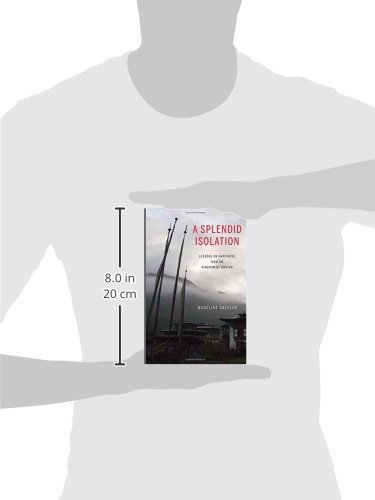



A Splendid Isolation: Lessons on Happiness from the Kingdom of Bhutan
L**K
Excellent preface to much needed Internal, National & World Discussions
Madeline Drexler has achieved a very rare quality with her essay, "A Splendid Isolation..." through the use of her years of experience as an investigative reporter on rather complex and delicate subjects; through her amazing compassion, never-ending curiosity, and clear, objectective thinking; and through her surprising willingness to allow her readers a glimpse into her personal spiritual journeys and how those affected or were affected by what she learned from Bhutan. The author's factual research is extensive and impeccable, yet it is how she wove the essential facts together with her observations, conversations and impressions upon every sensation she experienced that allowed me to feel as if I were there.As described by Drexler and the leaders of Bhutan that she spoke to, GNH (Gross National Happiness) is an ideal that Bhutan's visionary leaders over the last 40 years have strove to achieve, and while it has yet to be accomplished, its' guiding principles have produced a kinder and gentler population. Drexler had extraordinary access to the driving forces behind GNH, to those who's job it is to implement the various facets necessary to achieve that mission, as well as to the people, young and old, who are the beneficiaries and/or objectors to a government that stresses spiritual happiness over consumerism, self-reliance, and just about every step comprising Maslow's Hierarchy of Needs. Her people skills in getting her subjects to open up was topped only by her skills as a listener, to what was and was not being said.Clearly, the author went to Bhutan expecting it to be more than a working vacation, but any answers she originally sought appear to have been more elusive than expected and instead gave way to perhaps the deepest, most profound question that faces humankind, which in my own words is: "Can we (and will we) save our species from ourselves?" There are no quick answers and perhaps there can never be a "right" answer, atleast not as long as we remain "human". But Madeline Drexler has brought that question to the forefront at an extremely timely point in modern history. Let's keep the discussion going.
R**T
A Fascinating Look at Bhutan
While on a trip to Bhutan, I was made aware of this book. After spending ten days in the country, I appreciated the contents of the variety of essays written by Drexler. Her essays provide an examination of a variety of aspects of Bhutan, specifically the concept of Gross National Happiness (GNH) as viewed from different perspectives within the country. This book is written for a specific audience--people interested in Bhutan, people who will or who have traveled to Bhutan.
K**H
An interesting challenge.....
This thoughtful essay offers a wonderful opportunity to see how the lofty ideals of good will, kindliness, and living well actually manifest in the country of Bhutan, even as it is confronted with the challenges of social change.Madeline Drexler's fascination with the question, `How is Gross National Happiness actually possible in the country of Bhutan?' presents both a challenge and a possibility to her reader. While I have historically thought the goal of `gross national happiness' was somewhat saccharine or naieve at best, I was delighted to read how smart and savvy folk are actually implementing public policy according to specific criteria related to the health and well being of the country. No, the process is not easy, and is apparently a constant challenge given the heavily western-influenced changes in that Bhutan is currently experiencing. But what Drexler found and shares with us is how these concerns have been institutionalized into the basic workings of social and governmental life and how specific persons are working with the ongoing challenge of implementation.Who says it isn't possible to change the way we individually and collectively live in our own country? Can we imagine what might be different if we were to change some of our national priorities and dynamics? Yes, it would require a radical shift from our values of individualism, competition and achievement to those of community, wholesome living, and care for the earth and each other. Even the possibility sounds heartening to me.Are we willing to expand our vision for what is possible here? Read the essay and challenge yourself. We don't have to go to Bhutan to be inspired.
R**N
Tradition in Progress
This beautifully written book opens up a remote and unfamiliar country in which Buddhism is ingrained in the fabric of social and political life. Drexler provides an introduction to Buddhism along with Bhutan, and also to the country's role on the world stage of progressive politics. However, the story of contemporary Bhutan should appeal to readers of any political or religious persuasion, since the author's love of the country does not preclude a deeply probing analysis of it. She is undaunted in reporting the conflicts and inconsistencies within Bhutan's concept of "happiness" and of itself. This account also serves as a case study of the effect of modernization on the social structures that originally sustained tradition in any number of countries now undergoing development. As Bhutan provides a particularly moving example of precious traditional values in action and peril, I look forward to a sequel, some 5 or 10 years hence, to tell us how the soul of the nation has fared in opening to the rest of the world.
S**N
Good Try but . .
This is really more of an extended article than a book. Though it is well-written and well-researched, it reflects the very limited time of the author in the country.I also have a quibble about how the expulsion of over 100,000 Nepalis is presented. They did not "emigrate" to refugee camps in Nepal, they were forced to leave. And these Nepalese were long in Bhutan before the 1960's, as the author stated.Still, my hat goes off to the Bhutanese and their determination to create a model of Gross National Happiness.May you be happy. May you be healthy. May you be safe. May you be at peace.
M**I
Not really bad
Not what I expected
S**T
Inspiring
Candid & humane look at the Gross National Happiness aim of BhutanLovely stories of her discussions with the Bhutanese & thought provoking
A**R
Interesting read about What Happiness Means in Bhutan
I like the investigative character of this book, and how the author talks to people from various social backgrounds in Bhutan to find out what makes them happy. I like the concept of GNH and how many countries these days try to adopt it, but more importantly how this concept is changing in the modern Bhutan.
P**E
An excellent short read
A fascinating personal account of the seductive 'Gross National Happiness' of Bhutan. Interesting insight before visiting the country.
H**O
An accurate portrait of modern Bhutan
A simple, accurate book that covers the aspects of this country and its people. It doesn't try to embellish life in Bhutan and exposes the problems that have come with 'development'. Nice read
Trustpilot
1 month ago
2 weeks ago